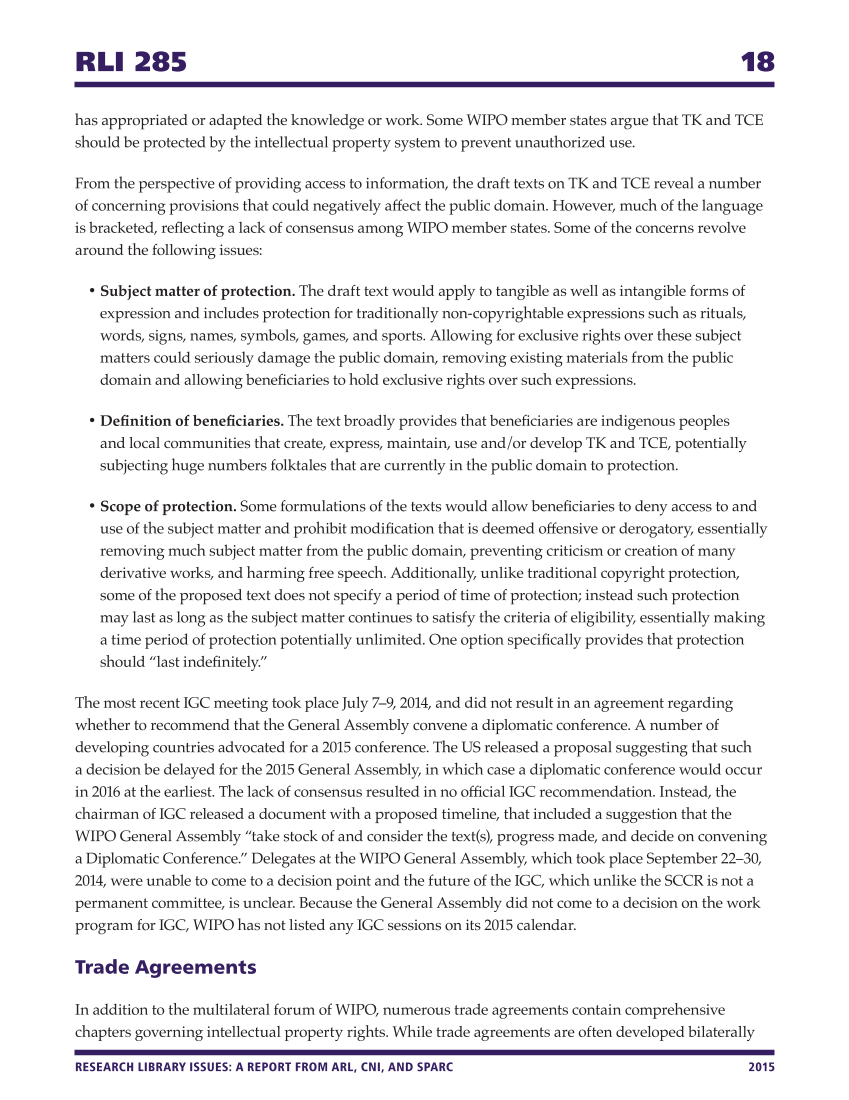RLI 285 18 RESEARCH LIBRARY ISSUES: A REPORT FROM ARL, CNI, AND SPARC 2015 has appropriated or adapted the knowledge or work. Some WIPO member states argue that TK and TCE should be protected by the intellectual property system to prevent unauthorized use. From the perspective of providing access to information, the draft texts on TK and TCE reveal a number of concerning provisions that could negatively affect the public domain. However, much of the language is bracketed, reflecting a lack of consensus among WIPO member states. Some of the concerns revolve around the following issues: • Subject matter of protection. The draft text would apply to tangible as well as intangible forms of expression and includes protection for traditionally non-copyrightable expressions such as rituals, words, signs, names, symbols, games, and sports. Allowing for exclusive rights over these subject matters could seriously damage the public domain, removing existing materials from the public domain and allowing beneficiaries to hold exclusive rights over such expressions. • Definition of beneficiaries. The text broadly provides that beneficiaries are indigenous peoples and local communities that create, express, maintain, use and/or develop TK and TCE, potentially subjecting huge numbers folktales that are currently in the public domain to protection. • Scope of protection. Some formulations of the texts would allow beneficiaries to deny access to and use of the subject matter and prohibit modification that is deemed offensive or derogatory, essentially removing much subject matter from the public domain, preventing criticism or creation of many derivative works, and harming free speech. Additionally, unlike traditional copyright protection, some of the proposed text does not specify a period of time of protection instead such protection may last as long as the subject matter continues to satisfy the criteria of eligibility, essentially making a time period of protection potentially unlimited. One option specifically provides that protection should “last indefinitely.” The most recent IGC meeting took place July 7–9, 2014, and did not result in an agreement regarding whether to recommend that the General Assembly convene a diplomatic conference. A number of developing countries advocated for a 2015 conference. The US released a proposal suggesting that such a decision be delayed for the 2015 General Assembly, in which case a diplomatic conference would occur in 2016 at the earliest. The lack of consensus resulted in no official IGC recommendation. Instead, the chairman of IGC released a document with a proposed timeline, that included a suggestion that the WIPO General Assembly “take stock of and consider the text(s), progress made, and decide on convening a Diplomatic Conference.” Delegates at the WIPO General Assembly, which took place September 22–30, 2014, were unable to come to a decision point and the future of the IGC, which unlike the SCCR is not a permanent committee, is unclear. Because the General Assembly did not come to a decision on the work program for IGC, WIPO has not listed any IGC sessions on its 2015 calendar. Trade Agreements In addition to the multilateral forum of WIPO, numerous trade agreements contain comprehensive chapters governing intellectual property rights. While trade agreements are often developed bilaterally























